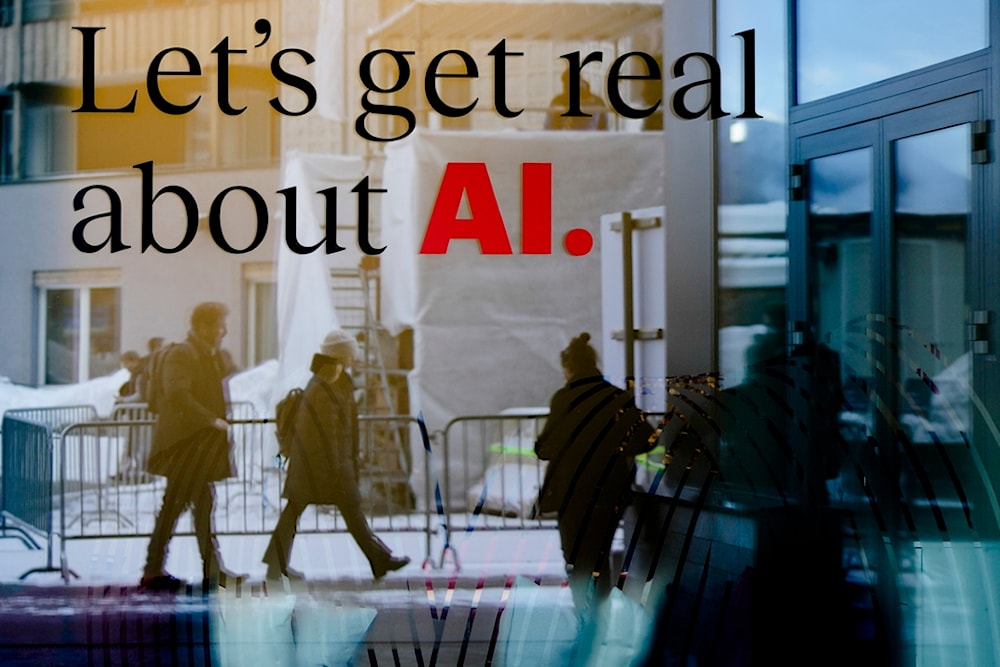AI takeover in UK: 8 million jobs on the line
A report by the Institute for Public Policy Research showcases the dangers of artificial intelligence, which is penetrating the labor market at a growing rate.
-

People reflected in a window of a hotel at the Davos Promenade with a slogan about AI alongside the World Economic Forum in Davos, Switzerland, Monday, January 15, 2024. (AP)
8 million women, younger and lower-wage workers might lose their jobs to Artificial Intelligence (AI) programs substituting entry-level, part-time, and administrative jobs, the Institute for Public Policy Research (IPPR) warned.
The Guardian reported, citing the IPPR, that the United Kingdom's bigger companies have adopted more AI systems that could read and create data, perform daily work transactions, and shut down certain lower-level positions. The report said this signifies the first wave of AI adoption. The second wave, on the other hand, could greatly automate more jobs.
The IPPR also analyzed 22,000 tasks, covering every type of job, and revealed that 11% of them are at risk of being automated. This includes routine tasks such as database management, scheduling, stocktaking, and several entry-level secretarial and customer service jobs.
As the second wave approaches, the number will increase to 59% as enhancements to AI will enable its fulfillment of more complex activities. For example, non-routine tasks, like copywriting, database creation, and graphic design, all of which fall under higher pay jobs, are prone to automation.
The most affected unit could most possibly be women, because of their exposure to secretariat and administrative jobs that are the first to be substituted, the IPPR found.
Read more: 'Godfather of AI' warns of tech dangers; quits Google
Polar opposite effects of AI
According to the report, in the most adverse situation of the second wave of AI, around 7.9 million jobs could be replaced, nullifying any economic benefits from enhanced productivity, and leading to stagnant GDP growth within three to five years.
In a more ideal scenario, where the entire workforce is fully augmented with generative AI, no jobs would be lost, and the economy could potentially grow by 4%, generating about £92 billion annually.
The think tank addressed its concerns and said the government must prevent a "jobs apocalypse", and instead of allowing AI to obliterate human jobs, it should be utilized to regenerate the economy and boost living standards.
AI's penetration into the labor market only entails two polar outcomes, either it disturbs it, or invokes economic growth, Carsten Jung, senior economist at IPPR, said.
“But technology isn’t destiny and a jobs apocalypse is not inevitable – government, employers, and unions have the opportunity to make crucial design decisions now that ensure we manage this new technology well. If they don’t act soon, it may be too late.”
Read more: UK growing more worried about potential use of AI to create bioweapons
The mechanization of Google
Riding the bandwagon, Google confirmed in January that it is eliminating "a few hundred" positions from its global ad team and replacing them with artificial intelligence for "efficiency and creativity."
It was expected that due to the small business ad campaign, more people would be hired by Google. However, the latter believes that the cuts to its "large customer" sales team will result in better support for small and medium-sized businesses advertising on Google's platform.
Google's cloud computing unit announced new AI tools to assist retailers "personalize online shopping, modernize operations, and transform in-store technology rollouts," referencing research findings that around 80% of US retailers feel it's urgent to embrace generative AI in their operations.
The Cloud's Vice President, Carrie Tharp, stated, "In only a year, generative AI has morphed from a barely recognized concept to one of the fastest-moving capabilities in all of technology and a critical part of many retailers' agendas."
Last year, Google also laid off around 12,000 people, about six percent of its workforce, amid inflation and rising interest rates.

 4 Min Read
4 Min Read








